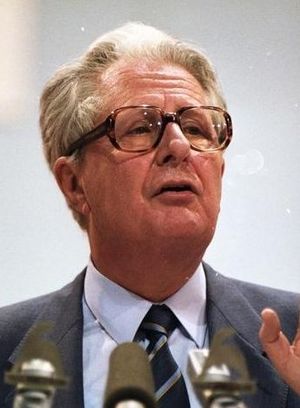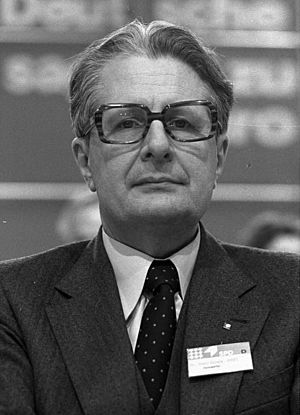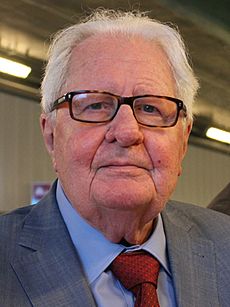Hans-Jochen Vogel facts for kids
Quick facts for kids
Hans-Jochen Vogel
|
|||||||||||||||||||||||||||||||||||||||
|---|---|---|---|---|---|---|---|---|---|---|---|---|---|---|---|---|---|---|---|---|---|---|---|---|---|---|---|---|---|---|---|---|---|---|---|---|---|---|---|

Vogel in 1988
|
|||||||||||||||||||||||||||||||||||||||
| Leader of the Social Democratic Party | |||||||||||||||||||||||||||||||||||||||
| In office 14 June 1987 – 29 May 1991 |
|||||||||||||||||||||||||||||||||||||||
| Federal Manager | Peter Glotz Anke Fuchs |
||||||||||||||||||||||||||||||||||||||
| Preceded by | Willy Brandt | ||||||||||||||||||||||||||||||||||||||
| Succeeded by | Björn Engholm | ||||||||||||||||||||||||||||||||||||||
| Leader of the Social Democratic Party in the Bundestag |
|||||||||||||||||||||||||||||||||||||||
| In office 8 March 1983 – 12 November 1991 |
|||||||||||||||||||||||||||||||||||||||
| Preceded by | Herbert Wehner | ||||||||||||||||||||||||||||||||||||||
| Succeeded by | Hans-Ulrich Klose | ||||||||||||||||||||||||||||||||||||||
| Governing Mayor of West Berlin | |||||||||||||||||||||||||||||||||||||||
| In office 23 January 1981 – 11 June 1981 |
|||||||||||||||||||||||||||||||||||||||
| Mayor | Guido Brunner | ||||||||||||||||||||||||||||||||||||||
| Preceded by | Dietrich Stobbe | ||||||||||||||||||||||||||||||||||||||
| Succeeded by | Richard von Weizsäcker | ||||||||||||||||||||||||||||||||||||||
| Minister of Justice | |||||||||||||||||||||||||||||||||||||||
| In office 16 May 1974 – 22 January 1981 |
|||||||||||||||||||||||||||||||||||||||
| Chancellor | Helmut Schmidt | ||||||||||||||||||||||||||||||||||||||
| Preceded by | Gerhard Jahn | ||||||||||||||||||||||||||||||||||||||
| Succeeded by | Jürgen Schmude | ||||||||||||||||||||||||||||||||||||||
| Minister of Regional Planning, Construction and Urban Development | |||||||||||||||||||||||||||||||||||||||
| In office 15 December 1972 – 16 May 1974 |
|||||||||||||||||||||||||||||||||||||||
| Chancellor | Willy Brandt | ||||||||||||||||||||||||||||||||||||||
| Preceded by | Lauritz Lauritzen | ||||||||||||||||||||||||||||||||||||||
| Succeeded by | Karl Ravens | ||||||||||||||||||||||||||||||||||||||
| Mayor of Munich | |||||||||||||||||||||||||||||||||||||||
| In office 27 March 1960 – 11 June 1972 |
|||||||||||||||||||||||||||||||||||||||
| Preceded by | Thomas Wimmer | ||||||||||||||||||||||||||||||||||||||
| Succeeded by | Georg Kronawitter | ||||||||||||||||||||||||||||||||||||||
|
|||||||||||||||||||||||||||||||||||||||
| Personal details | |||||||||||||||||||||||||||||||||||||||
| Born | 3 February 1926 Göttingen, Province of Hanover, Free State of Prussia, Weimar Republic (now Lower Saxony, Germany) |
||||||||||||||||||||||||||||||||||||||
| Died | 26 July 2020 (aged 94) Munich, Bavaria, Germany |
||||||||||||||||||||||||||||||||||||||
| Political party | Social Democratic Party (1950–2020) | ||||||||||||||||||||||||||||||||||||||
| Spouse |
Liselotte Vogel
(m. 1972) |
||||||||||||||||||||||||||||||||||||||
| Relations | Bernhard Vogel (brother) | ||||||||||||||||||||||||||||||||||||||
| Children | 3 | ||||||||||||||||||||||||||||||||||||||
| Alma mater | Ludwig Maximilian University of Munich | ||||||||||||||||||||||||||||||||||||||
| Occupation |
|
||||||||||||||||||||||||||||||||||||||
Hans-Jochen Vogel (born February 3, 1926 – died July 26, 2020) was an important German lawyer and politician. He was a member of the Social Democratic Party (SPD). He held many big jobs, like being the Mayor of Munich for 12 years and even the Governing Mayor of West Berlin. He was also a Federal Minister of Justice and led the SPD party in the German parliament, the Bundestag. He was known for helping to bring the 1972 Summer Olympics to Munich.
Contents
Early Life and Education
Hans-Jochen Vogel was born in Göttingen, Germany, on February 3, 1926. He went to school in Göttingen and later in Gießen. He finished high school in 1943.
During World War II, when he was 17, Vogel joined the German Army. He was wounded twice while fighting in Italy. After the war, he was captured by American forces. When he returned home, he studied law at universities in Marburg and Munich. He earned his law degree in 1950.
His career in law began in 1952. He became a judge and later worked for the city of Munich as a legal secretary.
Political Career
Mayor of Munich
Vogel joined the Social Democratic Party of Germany (SPD) in 1950. In 1960, at just 34 years old, he was elected Mayor of Munich. He was the youngest mayor of a city with over a million people in Europe at that time.
He became very popular, partly because he helped solve the city's traffic problems. He was re-elected in 1966 with a huge majority. A major achievement was helping Munich win the bid to host the 1972 Summer Olympics. This brought many improvements to the city's planning and transportation.
In 1972, Vogel stepped down as Mayor of Munich. He then became a leader for the SPD in Bavaria and a member of the party's national executive committee.
Serving as a Federal Minister
In December 1972, Chancellor Willy Brandt appointed Vogel as the Federal Minister of Regional Planning, Construction and Urban Development. This role involved planning for cities and regions.
Later, in 1974, when Helmut Schmidt became Chancellor, Vogel was made Federal Minister of Justice. He held this important position until 1981.
Mayor of West Berlin
In 1981, Vogel took on a new challenge. He became the Mayor of West Berlin. West Berlin was a city with many challenges at the time.
He helped deal with the issue of "squats" (buildings occupied without permission). He tried to find solutions by giving contracts to some squatters, while also stopping new occupations. Even though he worked hard, his party lost the next West Berlin elections. Richard von Weizsäcker became the new Mayor.
Leading the SPD Party
In 1983, Vogel became the SPD's main candidate for the national elections. He focused his campaign on disarmament and jobs. However, his party lost to Helmut Kohl's party.
After the elections, Vogel became a member of the German parliament, the Bundestag. He was chosen to lead the SPD group in the Bundestag, a position he held until 1991. Under his leadership, the SPD changed its stance on nuclear energy after the Chernobyl disaster in 1986.
From 1987 to 1991, Vogel was also the overall leader of the SPD party. He remained a member of the Bundestag until 1994.
After His Political Career
After 1994, Hans-Jochen Vogel left his main political roles. However, he continued to be active in important causes.
In 1993, he helped start an organization called Gegen Vergessen – Für Demokratie (Against Oblivion – For Democracy). This group works to promote democratic values and remember the past, especially the times of Nazi Germany and East Germany. He was its first chairman until 2000.
From 2001 to 2005, Vogel was also a member of the National Ethics Council of Germany. This council discusses important ethical questions, like those related to new technologies such as biotechnology.
Awards and Recognition
Hans-Jochen Vogel received several important awards for his work:
- In 1986, he was given the Grand Cross 1st class of the Order of Merit of the Federal Republic of Germany. This is a very high honor in Germany.
- In 1998, he received the Heinz Galinsky Prize for helping to improve understanding between the Jewish community in Berlin and others.
- In 2001, he won the Leo Baeck Prize, which is the highest award from the Central Council of Jews in Germany.
Personal Life
Hans-Jochen Vogel was known for being a mediator within his party. He was open to working with other political parties. He helped add environmental protection and women's rights principles to the German Constitution.
He once said that he was a Social Democrat who wanted to combine big ideas with practical, hard work in politics.
Hans-Jochen Vogel's younger brother, Bernhard Vogel, was also a well-known politician, but for a different party (the CDU).
Vogel married his first wife, Ilse, in 1949, and they had three children. They divorced in 1971. In 1972, he married his second wife, Liselotte.
In 2014, he shared that he had been diagnosed with Parkinson's disease. Hans-Jochen Vogel passed away in Munich on July 26, 2020, at the age of 94.
See also
In Spanish: Hans-Jochen Vogel para niños
 | Calvin Brent |
 | Walter T. Bailey |
 | Martha Cassell Thompson |
 | Alberta Jeannette Cassell |



